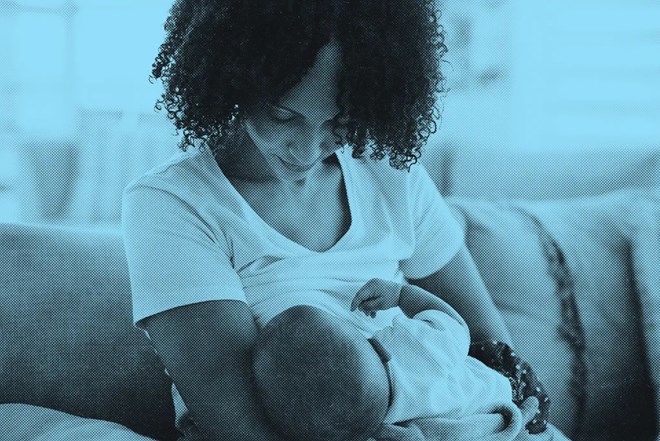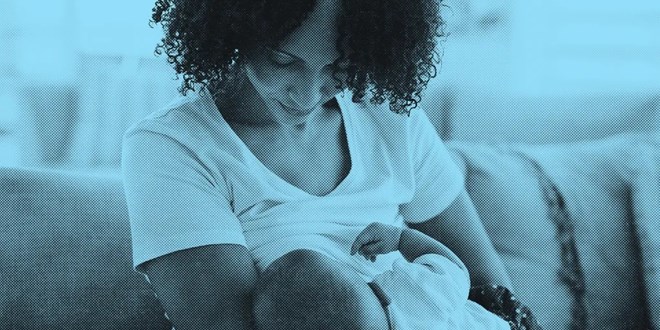[ad_1]

Wednesday January 17, 2024
By Cathy Wurzer and Alanna Elder

Photo illustration by Kim Jackson/ SAHAN JOURNAL
Under the umbrella of the Minnesota Breastfeeding Coalition, there are groups devoted to providing resources to Hmong and Indigenous families.
There could soon be a coalition to support Somali parents in breastfeeding. Shukri Jumale is the Midwest Fetal Care Center program manager at Children’s Minnesota and treasurer of the Minnesota Breastfeeding Coalition.
She was part of an effort that led Minnesota Muslim leaders in November to issue a fatwa, or religious interpretation, that encourages families to use donor breastmilk for babies when their parent’s milk is not available.
Jumale joined MPR News host Cathy Wurzer to talk about her work. You can learn more in a recent article from Sahan Journal.
We attempt to make transcripts for Minnesota Now available the next business day after a broadcast. When ready they will appear here.
Audio transcript
CATHY WURZER: Under the umbrella of the Minnesota Breastfeeding Coalition there are groups devoted to providing resources to Hmong and Indigenous families. Our next guest is working to create a coalition to support Somali parents in breastfeeding.
Shukri Jumale is the Midwest Fetal Care Center Program Manager at Children’s Minnesota and Treasurer of the Minnesota Breastfeeding Coalition. She was part of an effort that led Muslim leaders in Minnesota to issue a fatwa, or religious ruling, back in November. It encourages families to use donor breast milk for babies when their parent’s milk is not available.
Shukri is on the line. Thanks for joining us today.
SHUKRI JUMALE: Thank you, Cathy. Thanks for having me and having this important topic.
CATHY WURZER: Say, there’s always a story behind why someone gets involved in an effort. What inspired you to make breastfeeding more of an option to families?
SHUKRI JUMALE: Truly breastfeeding has been a passion of mine. I’ve been in the medical field now closer to 17 years and especially in the maternal health field. And seeing families struggle just to make the right decision when it comes to nutrients for their babies, feeding their babies, and understanding just what barriers are there for people that look like me, and you know, are like me, has been incredibly hard for me to watch and not do something about it.
So I have loved anything related to decreasing disparities in the maternal fetal world, but breastfeeding has been a passion of mine as it is something that is not really well spoken about and it’s not super supported in our community at this moment.
CATHY WURZER: Is that why you’re trying to create a Somali Breastfeeding Coalition?
SHUKRI JUMALE: Yes, that’s correct. We realize that when we have our Hmong Coalition and Indigenous Coalition, that there’s resources that are culturally appropriate, religiously appropriate here in the Somali community that are being able to be shared across the span.
So if a family or a team, the family is delivering, let’s say, in a rural hospital and they need resources, you don’t want them to look around and not find anything online. So the Minnesota Breastfeeding Coalition’s template of sharing across hospitals, across all organizations is a great way of sharing the correct information from the right people to the providers and patients that need it.
CATHY WURZER: Shukri, you mentioned barriers to breastfeeding in the Somali community. What are they?
SHUKRI JUMALE: Yeah. There’s a number of barriers, but currently what we’ve identified is the support piece and the education piece. So the lack of familial cultural support. You often feel like you’re going against the grain when you’re wanting to nurse and everybody in your circle and in your family has done the formula route.
And doing that alone feels really isolating. So having that support and having champions for breastfeeding in our community is a must. And then for the educational support, we’re finding there is a lack of culturally appropriate, language appropriate education out there.
Oftentimes when you have a breastfeeding class that’s available to patients, it’s at a cost, and maybe at a distance, and it’s not often in the language or the appropriate mode of learning for that patient. So having education that is appropriate and having it at a zero expense or to a limited, little expense to the families that need it is a priority of mine. And I’m hopeful that with the Somali Breastfeeding Coalition sponsored by the Minnesota Breastfeeding Coalition we’ll be able to create something like that online.
CATHY WURZER: Are there any religious restrictions to breastfeeding in the Somali community that you had to overcome at all?
SHUKRI JUMALE: Yeah. That’s actually a good question. All of Islamic literature and Quranic verses are really supportive of breastfeeding. Breastfeeding is actually encouraged for the first two years of baby’s life. What we are seeing a barrier to is the donor breast milk.
Working at the Midwest Fetal Care Center, we work with highly complex conditions and babies who are often born ill or before their due date. They’re often low birth weight. And our expert team is able to inform patients throughout the whole process. But then when it comes to feeding baby, we hit a barrier where we have a part of our patient population who are uncomfortable with the recommended donor breast milk.
We know donor breast milk, especially for these babies who are not fully developed, is very important, but then we’re finding some type of hesitance in our Somali community, especially due to religious factors. And having the fatwa that happened exactly three months ago yesterday was really a groundbreaking movement.
Because it did clarify current Islamic law and then helped families understand what their religious stands were. So they’re not going in there feeling like they’re going against their religious beliefs.
CATHY WURZER: Do you think most families are aware of this fatwa?
SHUKRI JUMALE: You know, I think it’s getting there. The unique piece of the way we got to this fatwa was not only we worked with a really nice group of community advocates, the Brighter Health Team. And we were able to not only invite the Islamic council in Minnesota, but the entire Muslim mosques.
So we were able to have a larger group of invites for the first learning and educational sessions that we did with the religious leaders. They were learning from us on the medical benefits and medical needs of donor breast milk, and we learned from them on the religious text.
So having that large group of people that were either available that day or available after the fatwa created a kind of a network of champions, I would say. So let’s say it’s a family that has their spiritual care leader in Saint Cloud and they’re going to their spiritual care leader unsure whether donor breast milk is something that’s allowed, they’re able to have somebody who’s well-informed. So it’s been really nice to use the networks within the community, within the Islamic community, within the Somali community to get the message out. Of course, we’re also creating resources for our providers in the hospitals.
CATHY WURZER: So you mentioned that there’s obviously education with the donor breast milk, but just generally speaking as you know in the population there’s still a lot of misinformation, misconceptions about breastfeeding, right? So a lot of people think formula is better, and there’s I think that’s maybe part of the Western culture.
How do you surmount those challenges? You know, breast milk scientifically we know is better. So how do you drive that point home?
SHUKRI JUMALE: Absolutely. Yes, and not only is it medically but also religiously there’s a huge verses and huge literature on breastfeeding being the best nutrition for babies the first two years. What we are able to do is actually do education in terms of making sure people understand human donor breast milk versus the formula, which is cow’s milk or a milk that is not something that’s magically formulated in a lab for babies.
It’s something that is an option if there is no other options. So some of the educations that we’re creating is to say there is a hierarchy of the nutrients and the importance of the milk. So mom’s milk, of course, is the priority. We want to make sure that you are able to feed your child, but if that’s unavailable or that’s limited, then you do have donor breast milk as the second option that could help your baby and get the same benefits. And then if that’s not an option for you for whatever reason and your family’s making this informed decision or they’re aware of all their options, then formula is that third option.
CATHY WURZER: Final question here for you. What are your next steps as you really start to do the work? You’ve been doing so much work already, but what are the next steps to really solidifying the Somali Breastfeeding Coalition?
SHUKRI JUMALE: Yeah, honestly, it’s listening to the community and their needs. I mean, many of our team members now, and the questions that we’re hearing from team members is, people want to know more. They’re like, oh, there’s a fatwa that happened. There is a clarification that happened. Tell me more about it.
And so we want to give providers in the health care field as well as our patients more information. We have the Breastfeeding Coalition’s coming out with three videos on this topic, dedicated and actually meant for patients where a patient can open this video whether they’re at the bedside or at home and they’re able to share with their family what it means to have donor breast milk.
Why donor breast milk fatwa was done, and then just talks families through the process. That is the first step, and that’s actually finalizing this week. So you should be able to see that in the Minnesota Breastfeeding Coalition website. And then we’re also creating handouts and more papers that people can use in the hospital setting as well as at home to better educate their families on breastfeeding in general as well as donor breast milk.
CATHY WURZER: Well, Shukri, it’s been a pleasure talking to you. Thank you. Best of luck moving forward.
SHUKRI JUMALE: Thank you so much, Cathy. I appreciate it.
CATHY WURZER: We’ve been talking to Shukri Jumale. She is a member of the Minnesota Breastfeeding Coalition and a Program Manager for the Midwest Fetal Care Center at Children’s Minnesota. By the way, you can read more about her work in a recent article from Sahan Journal. We’ll have a link to it on our website. That’s mprnews.org.
[ad_2]
